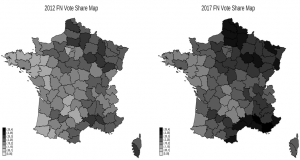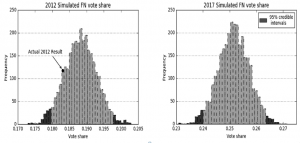As the outcome of the first round in this year’s French presidential election will be known this Sunday, MPP student Pierre Daix-Moreux presents his own statistical forecast, with an important focus on one of the main front-runners: Marine Le Pen.
If modelling an election is a genuine challenge, understanding France’s current presidential campaign might be one further difficult step in the forecasting and political analysis realm. Still, the Front National – the perennial outside agitator in French presidential politics – appears today as the party with the most certain chance of entering the second round of France’s current presidential run off, both from a polling and statistical point of view. It appears the party of Marine Le Pen will near certainly pass the first round barrier in the coming election or at the very least win one of its best results since the party’s founding.
In some regards, the Front National’s current rise might be seen as beginning with the strategic shift of the party to appeal to more moderate voters undertaken by Le Pen when she was elected as party head in 2011. Since, Le Pen explicitly worked at distancing the traditionally fascist party from anti-Semitic and other extreme viewpoints of the Front National original founder, namely her own father, Jean-Marie Le Pen. Following this new political plan, the share of French citizens acknowledging the Front National as a danger to democracy rapidly fell from 70% in the 2000’s to just 47% in 2013, despite the fact there remain prominent party members and advisors whose personal history and ideology can be traced to much darker times in the party’s history.
Also fuelled by the disclosure of various public scandals and a further alignment of beneficial political conditions, the decrease in the Front National electoral results’ volatility at both minor and major elections since 2012, which characterised Jean-Marie Le Pen’s previous leads, illustrate just how consistently the French far-right party has expanded its base and consolidated its electoral pool against a backdrop of an unstable European economic and political context inherited from the 2008 financial crisis. Thus, Le Pen seems now more than ever on the brink to pass the first round barrier, and with an all-time high vote share.
Going back to shorter run views, although Le Pen is herself under investigation, the multiplication of political scandals, especially regarding the once-upon-a-time-favourite right wing candidate François Fillon, came in handy to fuel Le Pen’s anti-elite discourse. Primarily used as a means to distract from the anti-Semitic and xenophobic history of the far-right party, such events provide Le Pen with ample opportunity to distance both herself and the party from its shady ideological roots, solidifying her lead as the only political alternative to a largely corrupted “elite system”.
On top of this, the use of primaries in a context of political and economic uncertainties has contributed to an exceptional fragmentation of the French ideological landscape. On the left side of the political spectrum, holding primaries has resulted in the whole traditional French Left in disarray. Strong ideological tensions taking place between social reformism and more leftist stances have made any grand popular left coalition impossible to emerge. On France’s right-wing side, “Les Républicains” party now is at the mercy of François Fillon, a candidate drowned in an ocean of scandals but doped up with a 4 million voter landslide victory in November 2016. Unfortunately for Les Républicains, they remain divided between “backers” and “runners”, the latter group being composed of previous supporters of Fillon’s main primary challenger, Alain Juppé. This division has left France’s traditional right-wing party unable to get its core campaign messages heard by the media and French citizens, seriously undermining its chances of reaching the election’s second-round. In that sense, Emmanuel Macron’s movement rightly took advantage of this sentiment to look as the only movement ready to provide a credible alternative to Marine Le Pen’s proposed gloomy future.
Combining the currently stressed politico-economic context as well as the Front National’s long term political strategy and trends, several theories and predictions can be made regarding possible results in France and the degree to which Marine Le Pen’s rise was predictable, if one accounts for determinants like unemployment levels and poor GDP performance.
Using these determinants as predictors and with the help of basic regression and simulation techniques backed up by data dating back from March 1986 collected through December 2016, we find results in line with current French polls, which all tend to say one thing: Marine Le Pen will make it to the second round on April, 23rd, and with an all-time high presidential vote share for her party. It seems that French pollsters are going get things right this time, at least for the Front National – a feat that can still be viewed as major “progress”.
In the aftermath of disappointing polling performances for the U.S. presidential elections, conventional wisdom has never before pushed us so hard to interpret both polls and forecasting models with extreme caution. However, as we tried our method with the 2012 Front National metropolitan results, excluding France’s overseas territories, our experiment seemed to perform well, as illustrated by the distribution we obtained comparing our 3000 simulations with the actual 2012 result. Thus, we adopted a similar strategy for 2017, and after having estimated different parameters at the department level, we again simulated 3000 results and averaged them following each department’s electoral body size.
The result is pretty straightforward: in 95% of our simulations we obtained a vote share falling between 24% and 26.5% for the Front National – adjusted at the metropolitan level. From a department by department point of view, our model gives us a pretty conservative idea of how people will vote for the Front National at this election: those who relatively massively voted for the Front National in 2012 will strike again stronger this time, reflecting Marine Le Pen’s increasingly anchored electorate both at a local and national level.
With regard to current polling data, our model thus seems to be in line with what to expect on April, 23rd. As of the writing of this article, the last known poll conducted, with a 1005 respondent sample, gave Marine Le Pen a second round battle against Emmanuel Macron. However, elephants in the polling room remain. Firstly, the sudden rise of Emmanuel Macron may be a shaky one, as undecided voters might in fact constitute one of the largest pools of voters at this election. Indeed, in a time of high political discontent and dispersion, abstention levels, hard to estimate but often decisive, may reach unprecedented levels. That is why – and although its relationship with far-right voting results still remains unclear – the ever stronger presence of non-party voters, illustrating political dissatisfaction or at least disengagement, may further weaken traditional parties competing for France’s supreme job, further fuelling doubts as to who will be Marine Le Pen’s challenger for the second round on May, 7th.
 Currently a dual-degree student at Hertie and Bocconi, Pierre Daix-Moreux is particularly interested in French politics and economic policy-making. He’s furthermore an enthusiastic amateur chess player as well as a fervent supporter of Paris Saint-Germain.
Currently a dual-degree student at Hertie and Bocconi, Pierre Daix-Moreux is particularly interested in French politics and economic policy-making. He’s furthermore an enthusiastic amateur chess player as well as a fervent supporter of Paris Saint-Germain.

